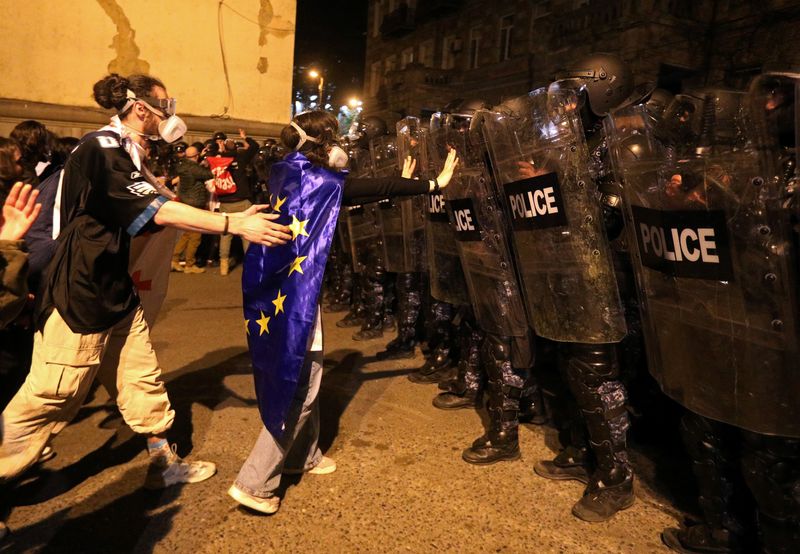By Felix Light
TBILISI (Reuters) - Georgians have been protesting outside parliament since the government said on April 3 it was reviving a bill on "foreign agents" that it shelved last year after mass demonstrations.
What's going on and why does it matter?
WHAT IS THE 'FOREIGN AGENTS' BILL AND WHO'S CALLING FOR IT?
The draft Law on Transparency of Foreign Influence would require all organisations receiving more than 20% of their funding from abroad to register as agents of foreign influence, with fines for those who do not obey.
The ruling Georgian Dream party is promoting the bill, which it says is modelled on a U.S. law, the Foreign Agents Registration Act (FARA). It says the legislation is needed to promote transparency and combat "pseudo-liberal values" imposed by foreigners.
WHO OPPOSES IT AND WHY?
Georgia's opposition dubs the bill "the Russian law", comparing it to legislation that the Kremlin has used to crack down on political opponents and silence dissent. In Russia, hundreds of journalists, politicians, rights organisations, environmental groups, LGBTQ support networks and others have been listed as foreign agents, obliging them to label themselves as such every time they publish anything on social media or elsewhere. The use of the term "foreign agent", which carries connotations of spying, has been used to create a climate of suspicion around people and organisations that the authorities want to portray as subversive.
Critics of Georgia's foreign agents law say it is part of a wider authoritarian trend by Georgian Dream, which has recently passed a law to assert its control of the electoral commission and has proposed sweeping restrictions on LGBT rights ahead of elections due by October.
WHY IS THE GOVERNMENT REVIVING THIS IDEA NOW?
The new bill is almost identical to one that the ruling party tried to introduce in March 2023. That time, it backed down after two nights of violent protests. The government now says that people were misled by the "radical opposition" into opposing the law, and that it will try again. In response to criticism from Western countries, Tbilisi has stressed that it has the right to demand transparency from NGOs operating in the country. It has not specified which organisations would become foreign agents, should the law be passed, but has accused NGOs of championing LGBT rights, an unpopular cause in conservative Georgia.
WHAT DO RUSSIA AND THE WEST SAY?
The United States, Britain and European Union countries have all warned Georgia against passing the bill, which the EU says is incompatible with its values. Georgia received EU candidate status in December - a step towards eventual membership of the bloc - but the EU said that further progress was conditional on Tbilisi making further progress with reforms.
Russia says it wants "stability and predictability" in Georgia but denies it is exerting pressure on its neighbour to enact the law. The Kremlin says it is absurd for opponents of the bill to portray it as a Russian project. Its spokesman Dmitry Peskov said on Wednesday that the situation in Georgia was being used to "provoke anti-Russian sentiments" and that the Kremlin was closely watching developments.
WHAT'S AT STAKE FOR GEORGIA?
Georgia, a country of 3.7 million people which until l991 was ruled from Moscow as part of the Soviet Union, stands at a crossroads in its international relations. The bill's critics say passing the law could cost Georgia its chance of integration with the West and align it more closely with Russia.
Russia is deeply unpopular in Georgia because of its imperial history under the tsars and the Soviets as well as Moscow's current support for the breakaway regions of Abkhazia and South Ossetia, over which Russia fought and won a brief war with Georgia in 2008. Though traditionally pro-Western, Georgia's government has refused to impose sanctions on Moscow over the war in Ukraine, instead restoring direct transport links to Russia, angering pro-Ukrainian Georgian public opinion.
The latest protests highlight deepening divisions in an already polarised country, pitting the ruling party against the opposition, much of civil society, and the country's ceremonial president.
WHY DOES IT MATTER TO THE REST OF THE WORLD?
Georgia occupies a strategic position next to Russia, Turkey, Armenia and Azerbaijan in a region criss-crossed by oil and gas pipelines and bordering the Black Sea. Like Ukraine, it has found itself caught between Russia and the West since the collapse of the Soviet Union and has fought a war with Moscow - though in Georgia's case it lasted only five days, in Ukraine's more than two years. Both Georgia and Ukraine have been promised eventual NATO membership. The West has an important stake in whether Georgia returns to Moscow's orbit or throws off Russian influence - and whether that can be done without triggering further conflict.
